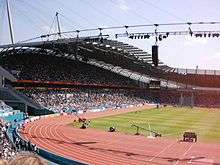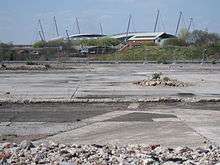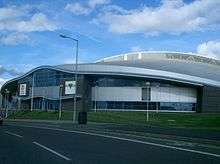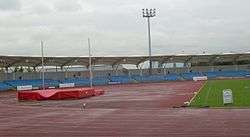Sportcity
Sportcity in Manchester was used to host the 2002 Commonwealth Games.[1][2] It is in east Manchester, a mile from Manchester city centre, and was developed on former industrial land including the site of Bradford Colliery.
Sportcity's largest structure, the City of Manchester Stadium, was built for the 2002 Commonwealth Games. It is now home to Manchester City F.C. and is one of the largest football stadiums in England. The Manchester Velodrome is the base for British Cycling and the National Indoor BMX Arena was completed in 2011. SportCity is home to the National Squash Centre and the Manchester Regional Arena for athletics. Future developments will include Manchester City's £50m training complex and a leisure complex.
Location and venues

The Sportcity complex is in Beswick and Bradford in east Manchester. A visitor centre provides information on the site's history from a heavily industrialised area to its ongoing regeneration.[3] The Etihad Campus tram stop on the Manchester Metrolink close to Joe Mercer Way became operational on 11 February 2013.[4]
Sportcity was the proposed location for the U.K.'s first SuperCasino,[5] but the plan was rejected by the House of Lords.[6] It was also the proposed site of an 85-metre (279 ft) wind turbine in 2006. Designed by Norman Foster, the turbine was intended to provide power for the stadium and nearby homes, but safety concerns about ice on the blades led to the proposal being abandoned.[7]
City of Manchester Stadium
The City of Manchester Stadium was used for the 2002 Commonwealth Games and is the home of Manchester City Football Club. The stadium with twelve 70 metre high masts and a capacity of just over 55,000 has become a landmark on the Manchester skyline. The stadium is leased to the football club.[8] The stadium lease was renegotiated in October 2010 and Manchester City will pay Manchester City Council £3 million a year rather than paying half the revenue over 35,000 ticket sales which amounted to approximately £2 million.[9] The club plans to increase the stadium's capacity to 60,000 by adding a third tier to the north and south stands.[10]
National Cycling Centre
The National Cycling Centre is a multipurpose cycling venue including the Manchester Velodrome, National Indoor BMX Arena, and mountain bike trials.
Manchester Velodrome
Manchester Velodrome was built for Manchester Olympic bids in the 1990s and used for the 2002 Commonwealth Games. The velodrome had a lasting legacy and in the Beijing Olympics in 2008, the British cycling team—based at the velodrome—dominated the cycling events.[11][12] The track has garnered a reputation for speed and by 30 March 2008, more than 15 world records had been set there, including Chris Boardman's 1996 and 2000 hour records and the 4000 metre team pursuit record set by the Great Britain men's team at the 2008 World Championships.
National BMX Arena
British Cycling and Manchester City Council, in partnership with New East Manchester worked together to deliver the 110,000-square-foot (10,000 m2) National Indoor BMX Centre which opened in 2011.[13] It was designed by Ellis Williams Architects, and built by contractors Sir Robert McAlpine. Alongside the velodrome, the £24 million complex will form the National Cycling Centre. It has 2,000 seats, a BMX area and offices for the headquarters of the British Cycling Federation.[14]
Manchester Regional Arena
Manchester Regional Arena is a multipurpose stadium at SportCity primarily used for athletics and football. It was developed as the warm-up track for the 2002 Commonwealth Games held in the adjacent City of Manchester Stadium. It has hosted the AAA Championships and Paralympic World Cup, and was the reserve home ground of Manchester City reserves before the team moved to Ewen Fields in June 2010.
The National Squash Centre
The National Squash Centre is another part of the Sportcity complex which was constructed for the 2002 Commonwealth Games. Costing approximately £3.5m, the facilities include six courts and a glass-walled show court which cost £110,000. The show court is moveable: it floats on air like a hovercraft and can be positioned in the athletics hall for major tournaments. All the courts can be converted into singles or doubles courts at the touch of a button.
Future development

In March 2010, Manchester City signed an agreement with Manchester City Council and the New East Manchester Agency to explore alternative leisure proposals to replace the regional casino giving the club permission to expand its facilities.[15] The club plans to move its academy from Carrington Training Centre to the site. The £50m million training facility will house all the playing staff when the youth academy moves from Platt Lane.[16] Preparation began in April 2010 with remediation of the 17 acres (6.9 ha) site around the stadium.[17][18]
Jack Rouse Associates, the company that owns Ferrari World in Abu Dhabi emerged as a possible developer. A mixed-use development was listed on its website in October 2010.[19]
See also
References
- McKeegan, Alice (2014-07-15). "Legacy of Commonwealth Games lives on in Manchester". men. Retrieved 2018-09-12.
- "The Games". Commonwealth Games Legacy. Archived from the original on 2007-10-27. Retrieved 2007-12-05.
- Welcome to SportCity, SportCity Manchester, retrieved 2011-11-30
- Metrolink - East Manchester line, (Transport for Greater Manchester), retrieved 19 May 2013
- "Manchester is surprise casino winner". BBC. 2007-01-30. Retrieved 2007-12-05.
- Branigan, Tania (2007-03-29). "Lords throw out plans for Manchester supercasino". London: The Guardian. Retrieved 2007-12-05.
- "City stadium turbine plan backed". BBC News. 28 September 2006. Retrieved 30 September 2006.
- https://www.telegraph.co.uk/sport/football/teams/manchester-city/8257210/How-Manchester-City-won-the-stadium-lottery.html
- "Manchester City give council an extra £1m". www.menmedia.co.uk. 2 October 2010. Retrieved 10 October 2010.
- Taylor, Daniel (18 August 2009). "Manchester City's grand plan for Eastlands and its surrounds". London: guardian.co.uk. Retrieved 8 September 2010.
- "How GB cycling went from tragic to magic". BBC Sport. 14 August 2008. Retrieved 29 October 2010.
- "How Team GB's weekend of glory happened". Metro. 17 August 2009. Retrieved 29 October 2010.
- National BMX Centre opens in Manchester, The BBC, retrieved 2011-11-30
- National Indoor BMX Centre, Sir Robert McAlpine.com, retrieved 2011-11-30
- "MCFC and Manchester City Council sign agreement on proposals for east Manchester". mcfc.co.uk. 12 March 2010. Archived from the original on 24 March 2012. Retrieved 8 September 2010.
- "Manchester City planning new £50million training HQ". mirrorfootball.co.uk. 6 March 2010. Archived from the original on 12 October 2012. Retrieved 8 September 2010.
- "Manchester City stadium regeneration gets green light". building.co.uk. 12 March 2010. Archived from the original on 25 April 2012. Retrieved 8 September 2010.CS1 maint: BOT: original-url status unknown (link)
- "Car park information for fans". mcfc.co.uk. 7 April 2010. Retrieved 8 September 2010.
- "Futbol World - Manchester, England". www.jackrouse.com. October 2010. Retrieved 28 October 2010.

